When Arcangelo performed Handel’s Theodora on the penultimate evening of the 2018 Proms season, I wondered whether a small period-instrument ensemble and singers could surmount the challenges posed by the size and dimensions of the Royal Albert Hall and communicate, not just with emotional intensity, but with truly dramatic impact too. On that occasion, I commented that Jonathan Cohen drew from his musicians ‘music-making of exquisitely beautiful poise and sensitivity, and [Cohen] directed his singers and musicians in a performance of utmost care and conviction’, but that while the prevailing serenity was expressive and touching, there were few peaks of dramatic intensity. Words such as ‘tasteful’ and ‘polite’ seemed apt in 2018, and they were relevant once again with respect to this performance of Bach’s St Matthew Passion in which Cohen and Arcangelo returned to the RAH with a stellar team of soloists and the choristers of St Paul’s Cathedral.
This year, the extended RAH platform did bring the performers closer to the audience. Cohen’s harpsichord was framed by the two orchestras of seventeen players, led by Sophie Gent and Matthew Truscott; behind Tom Foster’s organ, centre-rear, the two choirs (also seventeen-strong) fanned upwards. To Cohen’s left, in the Stalls, were the young trebles of St Paul’s.
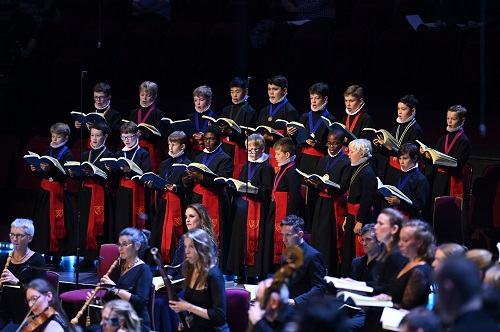
There’s no ‘correct’ way to present the Bach Passions: sombre or majestic, intimate or theatrical, as long as context and intent are consistent then an interpretation will compel and persuade. Indeed, the diversity of possible approaches, forces and emphases is testament to the works’ infinite richness and expressive power. But, given that Cohen professes to have aimed to ‘explore a dramatic pacing that brings the dialogue and action into focus in a meaningful way’, the decision for the soloists to perform from the front of the stage – rising from their side seats to take position for their arias, sometimes disappearing backstage to reappear on the other side, so as to ensure that they were placed alongside the appropriate orchestral group – seems an odd one.
It’s worth remembering that the polyphony of the St Matthew Passion was inspired by the architecture of the Thomaskirche in Leipzig: the church singers were split between the two organ lofts, thereby facilitating the dramatic elements of the Passion by creating immediacy as the solo characters and turba chorus interact. Here, the minor roles – Judas, Pilate and his Wife, the two Chief Priests, the Second Maid and First Witness – were sung from the choral ranks, but the solo arias were removed from their context, and the soloists’ role as microcosms of the collective sentiment or filters of the responses of those individuals whom they stand alongside, was diluted, something which was exacerbated by the fact that the soloists did not sing the chorales.
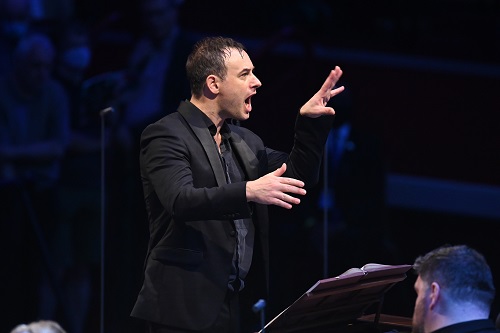
Putting this misgiving aside, Arcangelo’s performance was an unwaveringly refined and detailed one, the emotions conveyed with gentility but always with sincerity and clarity. There was tension at the start, the counterpoint turning and twisting above the stern low pedal with foreboding restlessness. Throughout, the playing and singing were meticulous, the phrasing thoughtful and stylish. Lightness prevailed as Cohen swept flowingly through the chorales and made the dramatic choral interventions swift and urgent, the rhythms springy and crisp. A simple opening of the palm or finger pointed aloft could garner colour and light from the choral forces, rendering the consoling joy of faithfulness: “Zu helfen den’ er ist bereit, Die an ihn gläuben feste” (He is ready to succour those who steadfastly believe in him). A flick of the wrist could launch a punchy, vibrant choral protestation: “Lasst hin, haltet, bindet nicht!” (Let him be, stop, do not bind him!).
Jonathan Manson’s viola da gamba communicated with particular vitality. In a programme-book interview, Cohen explains his intent to ‘draw out the potential of the instrumentation and the sound worlds that Bach creates’ and the orchestral colours were indeed precisely and potently defined. Instrumentalists stood for their obbligato solos, engaging dynamically with the vocal soloists, though this did again focus attention on the singers as ‘soloists’ rather than representatives of human experience and emotion, further weakening the sense of arias’ dramatic position within the tableau-like architecture of the unfolding scenes.
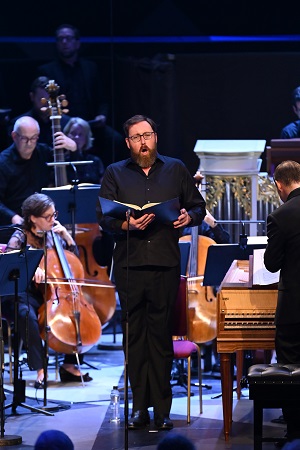
Initially I feared that tenor Stuart Jackson might be adopting a rather too reticent manner for the Evangelist and might struggle to pull us into the narrative, but I was wrong: this Evangelist may not have had oratorical stateliness, but Jackson’s sensitive articulation, and the relaxed warmth of his tenor, always easy at the top, had its own emotive magnetism. Jackson judged the structure and pace well, too, proving a powerful storyteller as the Evangelist’s own human response was communicated with increasing concentration and detail. Christ’s prayers on the Mount of Olives were tenderly described and Jesus’s feelings upon finding his disciples asleep powerfully evoked by Jackson’s gentle tenor, the pathos of the moment deeply felt: “Under er kam und fand se aber schlafend, und ihre Augen waren voll Schalf’s.” When the cock crowed, Jackson’s intensity chilled the blood; after a tense silence, the sudden pianissimo observation, “Da dachte Petrus an die Wrote Jesu”, was heavy with pathos. Again, Jackson waited, after Peter had gone outside, before embodying the disciple’s anguish in a twisting expression of pain and regret, “und weinete bitterlich” (and wept bitterly). Jackson’s account of the events at Golgotha, of the crowd’s hysteria, mockery and rebukes, was almost painfully expressive.
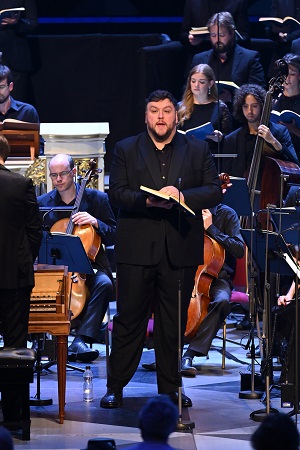
Matthew Rose’s Christus was a man of physical fortitude and striking presence, but there were times when a little more sense of human frailty might have been conjured. Jesus’ very first words, reminding all that the story is known, “des Menshen Sohn wird ūberantwortet warden, dass er gekreuziget werde” (the Son of man is betrayed to be crucified), were authoritative and forthright, and that rather set the tone. When Rose told his disciples, “Wahrlich, ich sage euch: Einer unter euch wird mich verraten” (Verily I say unto you, that one of you shall betray me), there was no arguing with this Master whose words seem both prophecy and condemnation. On the Mount of Olives Christ’s words to Peter and the two sons of Zebedee were sombre but not despairing, and his acceptance of his Father’s will was resolute – though such steadfastness wasn’t really conveyed by Roderick Williams in the subsequent aria, in which his baritone seemed uncharacteristically unfocused and the phrases sometimes ungainly. Later, however, Judas’s confession and guilt in “Geb mir meinen Jesum wieder!” were much more persuasively conveyed by Williams, and the baritone’s eloquent phrasing communicated the unwavering belief which compels Simon of Cyrene to carry Christ’s cross.
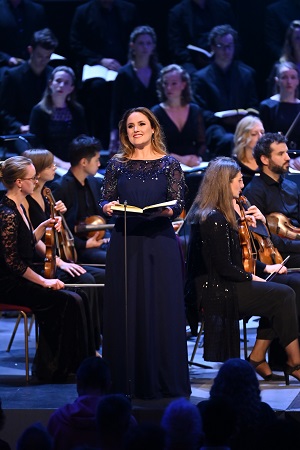
Countertenor Iestyn Davies and soprano Louise Alder blended beautifully in their Theodora duets three years ago, and they were similarly sweet of tone in their arias here though, in the first Part at least, the vocal beauty did not always seem expressive of a text which spoke of repentance, tears and remorse. Alder’s ‘Blute nur, du liebes Herz!’ (O bleed, thou loving heart) sounded far too serene, and the two oboes were a rather perky accompaniment to the avowal of spiritual devotion in ‘Ich will dir mein Herze schenken’. The soprano’s later avowal of Christ’s goodness and redemptive strength, “Aus Liebe will mein Heiland sterben”, was more touchingly imbued with devotional intensity, deepened by accompanying flute and oboes.
Davies never sings with anything less than grace and eloquence but it was in the opening aria of Part 2, with the second chorus, as the daughters of Zion search in vain for Jesus, that his vocal line became more fervent, naturally expressing human emotions which we too could know and feel. In ‘Erbame mich’ he held the Hall spellbound: who knew a voice could ‘weep’ with such beauty. The tender evenness of the ensuing chorale assuaged a little, though Cohen made sure that the collective sin was not forgotten, as the voices swelled, “Ich verleugne nicht die Schuld” (I do not deny my offence). The long lines of ‘Können Tränen meiner Wangen’ almost palpably evoked the slow fall of tears and blood from the wounds of crucified Christ,
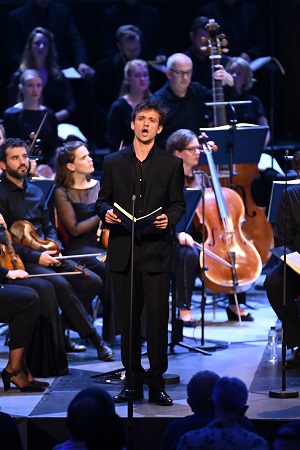
Making his debut at the Proms, tenor Hugo Hymas sang both of his arias with a lovely bright tone and excellent, unforced projection, convincingly evoking the spirit of the text. Jesus’s silence in the face of the accusations of the false witnesses and the interrogation of the High Priest was punctuated by the bitter stabs of the continuo and oboes, and Hymas sang with agility and feeling in the florid aria which tells of Christ’s hope that his Father will avenge his innocence, Manson’s taut viola da gamba countermelody deepening the conflict between frustration and faith.
Throughout Cohen guided his player and singers to meet the Passion’s musical demands but, from my vantage point at least, he did not seem to fully balance the devotional and dramatic elements. But, Cohen effectively shaped the quiet shadows of the close. The final chorale, ‘Wen ich einmal soll scheiden’, was magical, its peace and stillness rudely overturned by the turbulence of the quaking earth, but restored by the assuring collective understanding, “Wahrlich, dieser ist Gottes Sohn gewesen” (Truly, this was the Son of God).
Claire Seymour
Johann Sebastian Bach: St Matthew Passion
Louise Alder (soprano), Iestyn Davies (countertenor), Stuart Jackson (Evangelist), Hugo Hymas (tenor), Roderick Williams (baritone), Matthew Rose (Christ), Choristers of St Paul’s Cathedral Choir, Arcangelo Chorus, Arcangelo, Jonathan Cohen (harpsichord/director)
Royal Albert Hall, London; Thursday 9th September 2021.
ABOVE: Iestyn Davies (c) BBC/Chris Christodoulou